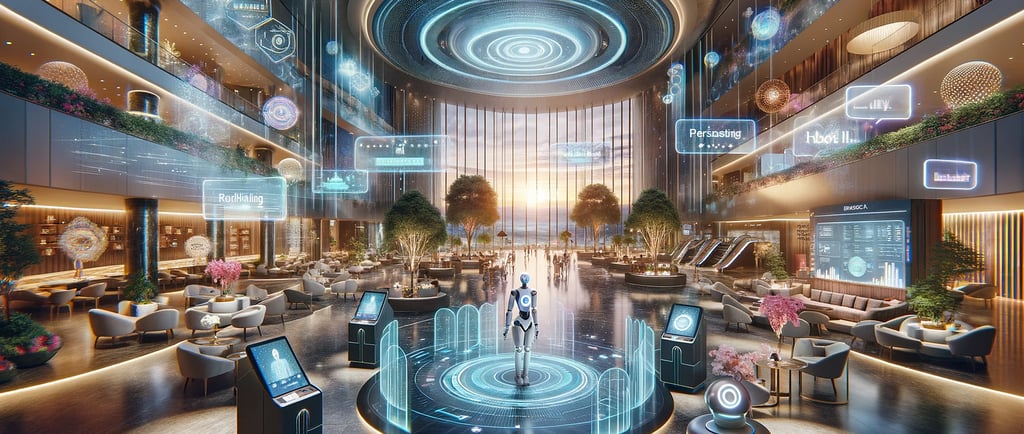How AI is Transforming the Hospitality Industry: Personalisation, Efficiency, and the Future of Guest Experience
Discover how Artificial Intelligence is revolutionising the hospitality industry - from personalised guest experiences to streamlined hotel operations. This blog explores the opportunities and challenges of AI in hotels, offering insights into how technology can enhance service while preserving the human touch. Perfect for hoteliers looking to stay ahead in a data-driven, guest-focused future.
Balve Bains
4/30/20253 min read


The hospitality industry is undergoing a rapid digital transformation. Once reliant on traditional guest services and manual operations, hotels are now embracing Artificial Intelligence (AI) to enhance personalisation, streamline operations, and reimagine the travel experience. As technology reshapes the sector, hotels strategically implementing AI set new standards in customer service, efficiency, and innovation.
AI and the Guest Experience: Personalisation at Scale
One of the most significant ways AI is revolutionising hospitality is through personalisation. By leveraging guest data and intelligent automation, hotels can tailor services and interactions to individual preferences, creating memorable and more meaningful stays.
According to a Deloitte survey from the European Hospitality Industry Conference:
52% of customers believe generative AI will be used for customer interactions.
44% expect it to drive guest engagement.
However, to realise the full benefits of AI-driven personalisation, hoteliers must deeply understand customer needs and anticipate every touchpoint in the guest journey. Poorly implemented AI can lead to generic interactions and negatively impact brand reputation.
“Through enhanced personalisation, AI can enrich guest experiences while preserving the human touch, thus redefining luxury hospitality.” - Puneet Chhatwal, M.D. & CEO, The Indian Hotels Company Limited (IHCL)
In luxury hotels, AI supports staff by automating routine tasks, like check-ins or room requests, allowing teams to focus on human-centred service. In some cases, receptionists now act as "experience officers," using data insights to elevate guest engagement. Meanwhile, budget hotels use AI to boost functional efficiency, offering fast, consistent service with fewer resources.
Operational Excellence: How AI is Powering Hotel Efficiency
AI is changing how hotels interact with guests and back-office operations. Revenue management teams now use AI-powered algorithms to optimise pricing strategies and forecast demand more accurately.
Beyond that, AI is being integrated into:
Investment analysis: Evaluating potential property renovations or acquisitions.
Guest satisfaction tracking: Analysing reviews and Net Promoter Scores (NPS) for real-time insights.
“AI in hospitality is still emerging, but it holds the potential to redefine how we deliver guest experiences. The real value lies in enabling staff to connect better with guests by predicting their needs.” - Richard Valtr, Founder, Mews
Data-driven insights are becoming essential tools for hoteliers, empowering decision-makers to respond more quickly and effectively to guest feedback and market trends.
Challenges of Adopting AI in Hospitality
Despite AI's promise, its adoption comes with challenges, especially for small - to mid-sized hotels. The cost of implementation, staff training, and system maintenance can be significant. Moreover, there's a risk of misalignment between AI applications and guest expectations, which can harm brand loyalty and trust.
Key challenges include:
Balancing innovation with core brand values.
Adapting AI solutions for different guest segments and hotel locations.
Keeping pace with rapidly evolving technologies while maintaining consistent service quality.
A successful AI strategy requires technical implementation, cross-functional alignment, continuous system upgrades, and a deep understanding of brand identity.
The Future of AI in the Hotel Industry
The hospitality industry is at a turning point. The future lies in thoughtful AI integration that enhances front-of-house and back-office operations without losing the human touch.
Here are five key priorities for hoteliers moving forward:
Enhance guest experience with the right mix of AI and human interaction.
Segment AI applications based on consumer preferences and hotel type.
Upskill the workforce to thrive in a data-driven, tech-enabled environment.
Address ethical and privacy concerns around AI and data use.
Stay agile to keep up with technology while maintaining service stability.
AI is no longer a futuristic concept - it's a strategic necessity in modern hospitality. From improving personalisation to driving operational efficiency, hotels that invest in AI today are setting the stage for long-term success. The key is to approach AI adoption with intentionality, empathy, and strategic foresight, ensuring technology enhances rather than replaces the warmth and uniqueness of the guest experience.
Keywords: AI in hospitality, hotel technology, guest personalisation, artificial intelligence in hotels, hotel operational efficiency, AI guest experience, innovative hotel solutions
Purple Square AI
Empowering hospitality with AI-driven automation solutions.
Support
Connect
hello@PurpleSquareAI.com
© 2025. All rights reserved.
